The digital advertising landscape is undergoing a significant shift with the arrival of the European Union’s Digital Markets Act (DMA). As an advertiser, staying informed and adapting your practices is crucial to navigating this change successfully. This guide dives into the DMA’s impact, what it means for you, and the essential steps to take.
Understanding the Digital Markets Act: Why it Matters
The Digital Markets Act aims to ensure fair competition and consumer protection in digital markets. While gatekeepers like Google, Meta, and Amazon are primarily targeted, EU-based advertisers or those reaching EU audiences will be affected. For example, advertisers that process EU resident data through Google’s ad ecosystem will be required to implement Basic Consent Mode by 6th March 2024 to preserve personalised ad features within Google Ads or the Google Marketing Platform. This means understanding the DMA’s implications is key to future-proofing your advertising strategy.
Here’s why the DMA matters to you as an advertiser:
- Enhanced User Trust: By complying with stricter data privacy regulations under the DMA, you can build trust with privacy-conscious users, potentially leading to higher engagement and conversions.
- Transparency and Control: The DMA empowers users with greater control over their data and transparency into how it’s used for advertising. This allows you to tailor your approach to be more respectful of user privacy and preferences.
- Level Playing Field: The DMA promotes a fairer market by limiting the dominance of gatekeepers and creating opportunities for smaller players. This could lead to more competitive ad pricing and access to a wider range of platforms and services.
- Maintain Capability of Ad Ecosystem: Given the legal implications for leading advertising platforms, such as Google, restrictions will be put in place for non-compliant brands trying to use these technologies. For example, Google has indicated that any brand that does not have Basic Consent Mode by 6th March 2024 will have the following features impacted/stopped:
- GA4 audiences
- Google Ads remarketing
- Floodlights
- Search Ads 360 and Display Ads 360.
- It is also likely that some features in Google Ads Manager may also be impacted as the assumption is that this will apply across the Google advertising ecosystem. Essentially, any seed list upload, plus the ability to use that list at all for audience targeting such as Remarketing Audiences, Exclusions, Similar/Look-alike will be affected.
Key Provisions Impacting Advertisers:
- Consent: Obtaining valid user consent for data collection and usage becomes paramount. Ensure your consent mechanisms are robust, transparent, and comply with Digital Markets Act regulations.
- Personalised Targeting: Sensitive data targeting might be restricted. Adapt your campaigns to focus on contextual and non-sensitive data elements, such as interests, keywords, and browsing behaviour.
- Transparency: Be clear about ad targeting practices and data usage. Provide your audience with easily accessible information about how their data is collected and used.
- Interoperability: The DMA paves the way for interoperability with third-party services. Explore alternative platforms and diversify your tech stack to reduce reliance on gatekeepers.
Taking Action for Compliance with the Digital Markets Act:
- Self-Assess: Conduct a thorough analysis of your current advertising practices to identify areas needing adjustments based on the DMA’s provisions. Alternatively, work with a partner like XPON to identify gaps in your ecosystem and an action plan to maintain compliance.
- Revamp Consent Mechanisms: Implement valid consent mechanisms that comply with DMA regulations. Consider using Consent Management Platforms (CMPs) to streamline the process and ensure transparency. For advertisers using Google’s technology, you will be required to implement Basic Consent Mode by 6th March 2024 to preserve personalised ad features in the Google ad ecosystem.
- Data Spring Cleaning: Review your data processing practices to ensure they adhere to anonymisation and purpose limitation principles outlined in the DMA.
- Stay Informed: Keep yourself updated on DMA developments and regulatory guidance. Subscribe to relevant industry newsletters and blogs to stay ahead of the curve.
Beyond Compliance: Opportunities Await with First-Party Data
While the DMA brings changes, it also presents opportunities for forward-thinking advertisers.
- Enhanced User Trust: Demonstrating compliance with the DMA builds trust with privacy-conscious users, potentially leading to higher engagement and conversions.
- Innovation Sparks: Adapt your strategies to explore new targeting methods and creative approaches that don’t rely heavily on sensitive data. This can lead to more innovative and effective campaigns.
- Level Playing Field: A fairer market with less gatekeeper control empowers smaller players and opens doors to new partnerships and collaborations.
Embrace the Change, Thrive in the New Era
The DMA may seem daunting, but with the right knowledge and proactive approach, you can adapt and even thrive in the new advertising landscape. Stay informed, take action, and embrace the change – the future of your digital campaigns can be brighter than ever!
Partner with XPON to simplify the complexity of the Digital Markets Act.
At XPON, we’re experts in privacy-first analytics and marketing principles, offering the expertise and tools to help you navigate the first-party data revolution. We can assist you in building a robust data foundation, embracing first-party data strategies and new tracking methods, and implementing effective targeting and personalisation strategies.
If you would like to discuss how XPON can support you further, get in touch with our team here.
Additional Resources:
